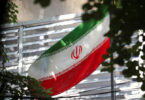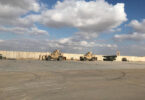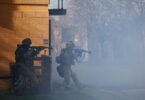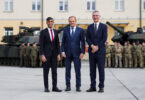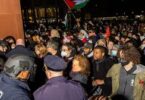BRUSSELS (AA): A meeting between Russian and NATO officials on Friday failed to make any progress on a landmark nuclear arms treaty.
NATO chief Jens Stoltenberg told a news conference following the meeting: “All members of the NATO-Russia Council agree that the [INF] Treaty has been crucial to Euro-Atlantic security. But the Treaty is now in jeopardy. And unfortunately, we have not seen any signs of a breakthrough.”
The Intermediate-Range Nuclear Forces (INF) Treaty, signed in 1987 by Soviet leader Mikhail Gorbachev and U.S. President Ronald Reagan, was largely designed to stave off the prospects of nuclear war in Europe.
The U.S. has announced that it will begin a six-month withdrawal process from the treaty on Feb. 2 accusing Russia of violating terms of the treaty by developing the SSC-8 land-based cruise missile.
Moscow denies the charge and in a last-minute bid to save the deal showed parts of the missile on Wednesday in a park on the outskirts of Moscow.
The NATO chief added the security situation in Ukraine was also discussed in the first meeting of 2019.
“On both of these issues, Allies and Russia fundamentally disagree,” he said.
He went on to say that Ukraine has been a key topic for NATO after Russia’s “illegal annexation” of Crimea in 2014.
“We discussed the heightened tensions in and around the Sea of Azov, as well as the security situation in eastern Ukraine.
“Allies made clear that they do not and will not recognize the illegal annexation of Crimea,” he said.
Russia and Ukraine have been at loggerheads since 2014, when Russia annexed Crimea after a controversial referendum.
Turkey and the UN view the annexation as illegal.
Stoltenberg also called on Russia to “immediately release the sailors and ships” it seized in November.
In November, Russia seized two Ukrainian navy ships and a navy tugboat along with 23 crew members off Crimea, accusing Kiev of entering its waters and provoking a conflict.
The NATO-Russia Council mechanism — established in 2002—allows parties to exchange views on topics of joint security.
However, after the incidents of 2014, the council turned into a platform to keep communication channels open between the two parties.

